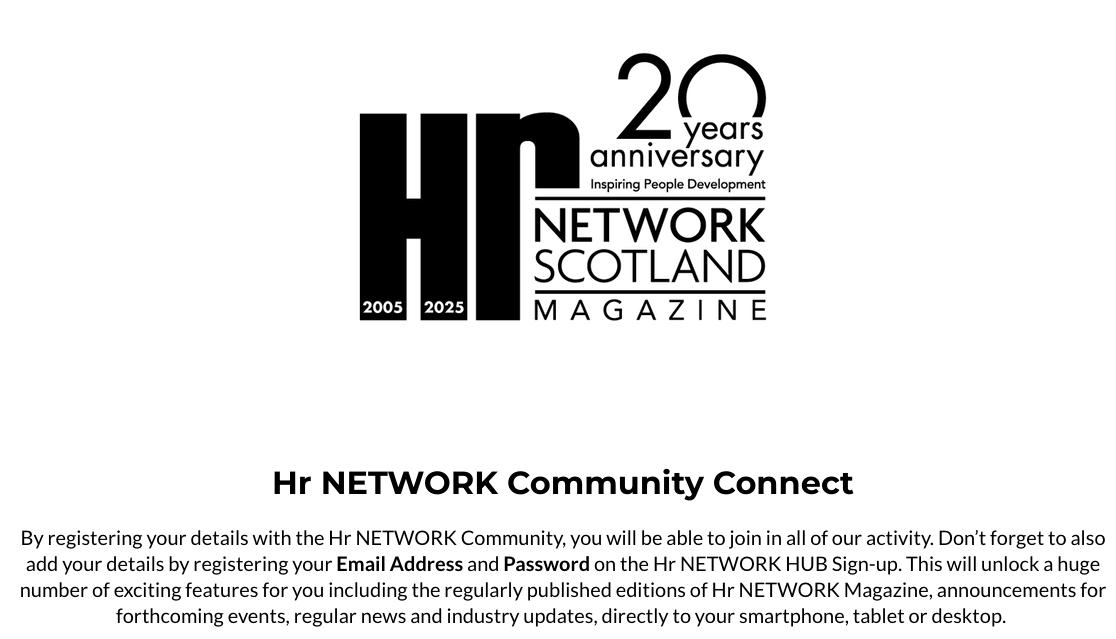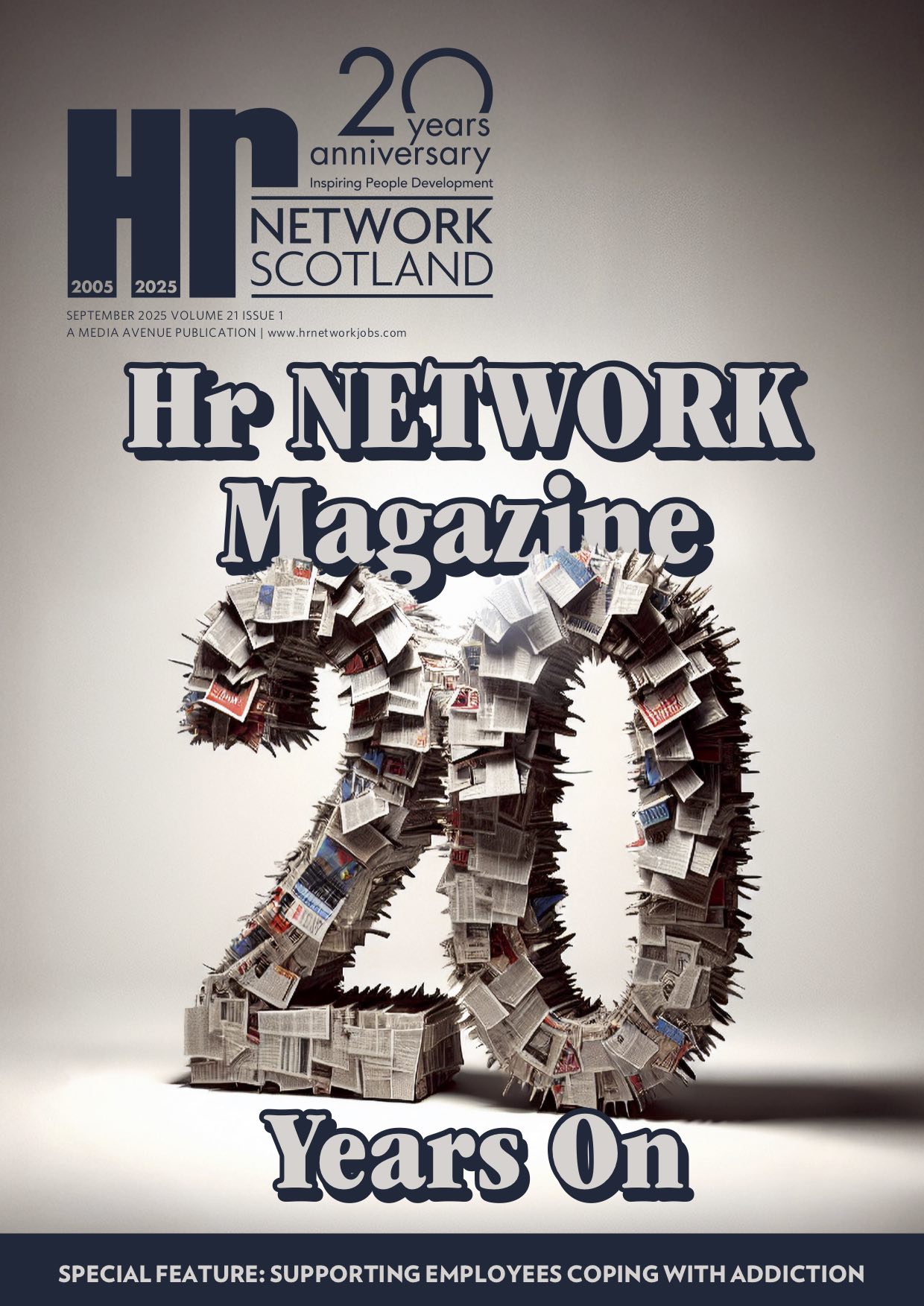Our Latest News
OUR SUBSCRIPTION SERVICE IS MOVING!!!! – STAY CONNECTED TO Hr NETWORK…
MAKE SURE YOU STAY CONNECTED TO Hr NETWORK MAGAZINE & EVENTS – OUR SUBSCRIPTION SERVICE IS MOVING!!!!

Hr NETWORK is delighted to announce our brand new Subscription Service Hr NETWORK HUB and we are currently in the process of migrating all our existing SUBSCRIBERS to our new platform.
Our FREE membership will continue and you will be able to access all our regular online magazine issues and we have added a whole lot more in to our subscription service including CHAT ROOMS and GROUPS, plus opportunities to get priority booking at our many events held during the year, including our very exciting Hr NETWORK National Awards Gala Dinner 2025, taking place at the hugely impressive Hilton, Glasgow on Thursday 13th November 2025.
All you have to do is click the link below and complete the Community On-boarding From, unless you have already done so and start accessing all our regular activity and find out what’s happening in the Hr NETWORK Community:
https://register.hrnetworkscotland.com/community-form
List of forthcoming Events taking part in 2025 and 2026:
Hr NETWORK Breakfast Club 2025/26
Hr NETWORK National Awards Gala Dinner 2025
Hr NETWORK National Conference & Exhibition 2026
Hr40 Dinners 2026
We have a number of sponsorship, advertising and Exhibitor opportunities at our forthcoming events and if you require any further information, please don’t hesitate to contact us on Tel: 0131 625 3267 or email: subscriptions@hrnetworkscotland.co.uk
OUT TODAY – September 2025 Issue of Hr NETWORK Magazine
OUT TODAY – September 2025 Issue of Hr NETWORK Magazine
SIGN UP TO OUR BRAND NEW Hr NETWORK HUB TO READ ALL OUR MAGAZINE ISSUES…
LATEST ISSUE: Hr NETWORK Magazine… 20 Years On
One magazine. 20 years. 120+ issues. As Hr NETWORK Magazine celebrates its 20th anniversary this month, Andy Moore discovers how more HR practitioners are throwing caution to the wind to embrace AI-driven workforce transformation and asks, what does the next 20 years look like for HR professionals?
Also in the latest issue:
- Meet the Judging Panel & Finalists for Hr NETWORK National Awards 2025
- SPECIAL FEATURE: Supporting employees coping with addiction
- The regular sections of the magazine include: News, STATS and EXTRA
- The ‘Insights’ section features first class comment from those in the know on a range of subjects including: Workplace ADHD Coaching; Money Laundering; Stress & Anxiety At Work; Employee Engagement
Click the front cover below to read the latest issue:
Skills shortages ease from post-pandemic peak but remain as high as in 2017
Skills shortages ease from post-pandemic peak but remain as high as in 2017
New data from the 2024 Employer Skills Survey, published recently by the Department for Education, shows a welcome decline in skills shortage vacancies as a proportion of all vacancies — down from 36% in 2022 to 27% in 2024. However, the level of skills shortages remains broadly unchanged from 2017 (22%), highlighting a persistent and entrenched challenge for the UK economy.
 The findings reveal that while the most acute pandemic-era pressures may be easing, structural mismatches between skills supply and employer demand continue to constrain business growth — particularly in high-value sectors such as construction, health and social care, and manufacturing.
The findings reveal that while the most acute pandemic-era pressures may be easing, structural mismatches between skills supply and employer demand continue to constrain business growth — particularly in high-value sectors such as construction, health and social care, and manufacturing.
Dr Joe Marshall, Chief Executive of the National Centre for Universities and Business (NCUB), said: “The drop in skills shortage vacancies from 36% to 27% is encouraging, but we must not be complacent. The fact that we remain above 2017 levels — rather than significantly improving — tells us that this is not a short-term issue. The UK’s longstanding skills mismatches continue to hold back innovation, productivity and growth.”
“What’s particularly telling is how this challenge affects businesses differently by size. While larger employers with 100+ staff have seen skills shortages ease significantly — from 34% to 19% — the smallest businesses with 2-4 employees continue to face the highest skills shortage density at 42%, unchanged from 2022. This suggests that smaller firms lack the resources and networks to compete effectively for skilled talent, creating a two-tier labour market that risks leaving our most entrepreneurial businesses behind.”
“To address this, we need a more joined-up approach between education and industry. Universities have a critical role in preparing graduates with the skills employers need — but this requires deeper collaboration, clearer routes into priority sectors, and long-term investment in talent development.”
NCUB is calling for coordinated action to strengthen the UK’s skills pipeline through:
- Expanded work-based learning and employer-led course design
- Improved data sharing on regional and sectorial skills needs
- Targeted support for sectors facing the greatest shortages
- Greater support for SMEs to engage with skills provision
Aon champions social mobility with award-winning UK work experience programme reaching over 1,500 students
Aon champions social mobility with award-winning UK work experience programme reaching over 1,500 students
AON has announced that its UK Work Insights Programme, launched in 2023, has now provided work experience to more than 1,500 students. The programme offers placements across eight Aon offices: Bristol, Birmingham, Chelmsford, Farnborough, London, Leeds, Manchester and Glasgow. Aimed at young people from lower socio-economic backgrounds, the programme is designed to expand access to careers in professional and financial services.
Aon has a longstanding commitment to improving access to opportunities for young people from lower socio-economic backgrounds and has worked with early talent specialist Connectr Early Engagement to help remove barriers and ensure a more inclusive pipeline of future talent.
In 2024 alone, more than 840 students enrolled in the programme. Participants came from over 290 schools and colleges across England and Scotland. Of these students, 46 percent were eligible for free school meals or a sixth-form bursary, 76 percent identified as being from an ethnic minority background and 55 percent were from outside London.
 The three-day programme is aimed at Year 12 and 13 students from state schools and offers exposure to the workplace by participating in business workshops, networking with current Aon employees and completing a real-world group challenge for which they receive feedback.
The three-day programme is aimed at Year 12 and 13 students from state schools and offers exposure to the workplace by participating in business workshops, networking with current Aon employees and completing a real-world group challenge for which they receive feedback.
To deliver this programme, over 700 Aon colleagues from across the UK have volunteered their time to coach, mentor and inspire participants. Their support has had a positive impact – 36 percent of all new Aon apprentices in 2025 will be alumni of the Work Insights Programme, a figure that the firm aims to double in the coming years.
Feedback from students has been overwhelmingly positive, with 91 percent of participants saying they would recommend the programme to a friend. The initiative has also received industry recognition, winning the 2024 Institute of Student Employers Award for Best Work Experience, Internship or Placement Programme and the 2024 Insurance Times Award for Diversity and Inclusion Excellence.
Jane Kielty, UK CEO at Aon, said: “It’s inspiring to see the difference made in just the first two years of our Work Insights Programme. We’ve seen firsthand the transformational effect of bringing greater numbers of young people into the workplace. Gaining direct exposure to our industry raises aspirations and equips the next generation with the confidence and insight needed to pursue careers in financial and professional services. We’re especially proud that one in 10 of Aon’s UK colleagues have volunteered their time to support the students, championing social mobility and helping Aon to thrive by building a pipeline of high-potential talent.”
Rachel Blake, MP for Cities of London, said: “It was a real pleasure to join Aon last week to welcome students to their Work Insight Programme. It was great to see so many young people proactively engaging with the world of work, and I was encouraged by the work Aon is doing to encourage and maintain a talented and diverse workplace.”
Professional recruitment market stabilising
Professional recruitment market stabilising
Recruitment across the professional recruitment sector is showing signs of stabilising, according to the latest Hiring Trends report from the Association of Professional Staffing Companies (APSCo).
 The trade association’s latest analysis – produced in conjunction with Bullhorn – revealed little movement in the number of new jobs added between May and June, remaining static for contract and falling less than 1% for permanent. This suggests that the previously noted sharp decline in hiring activity has plateaued.
The trade association’s latest analysis – produced in conjunction with Bullhorn – revealed little movement in the number of new jobs added between May and June, remaining static for contract and falling less than 1% for permanent. This suggests that the previously noted sharp decline in hiring activity has plateaued.
Encouragingly, the number of new permanent roles added in June 2025 was up 3% on June 2024, while contract fell 16% in this time frame. The data also revealed that the uptick in recruitment noted in APSCo’s previous report translated into positive placement figures, which were up 16% and 11% year-on-year consecutively for contract and permanent in June 2025.
Samantha Hurley, UK Managing Director at APSCo commented: “While monthly vacancy trends remain stable, they haven’t fallen at a rate we would expect to see at the start of the summer months, which gives us cause for optimism following a sustained period of more notable decline. It’s also promising to see some signs of growth year-on-year, though the next few months will be telling as to the direction of travel for the rest of 2025.”
Andy Ingham, SVP Sales, EMEA & APAC at Bullhorn, added: “The second quarter ended on a positive note with job openings holding steady across permanent and contract roles, and all placements increasing by 9.6% during the month of June. This uptick shows a return to pre-pandemic activity levels, avoiding
80,000 Scottish workers quit over a lack of flexibility as return-to-office pressure grows
80,000 Scottish workers quit over a lack of flexibility as return-to-office pressure grows
New CIPD research reveals a growing mismatch between employer and employee expectations which saw 80,000 Scottish workers leave their jobs in the past year due to a lack of flexibility. The research also points to growing tension between employers and employees over hybrid working. Almost half of Scottish employees (49%) said they felt pressure to spend more time in the workplace, with 71% agreeing most of the pressure is coming from senior leaders. Despite this, one in ten (10%) Scottish employers plan to introduce, or increase, mandated days in the office.
 However, people’s appetite for flexible work remains strong. Three per cent of Scots surveyed – equivalent to around 80,000 workers – say they have left a job in the last year (since January 2024) due to a lack of flexible working. In response, the CIPD is calling for a more balanced approach to return-to-workplace mandates, that consider both business and employee needs, support collaboration, talent attraction and retention, while giving people the flexibility they value.
However, people’s appetite for flexible work remains strong. Three per cent of Scots surveyed – equivalent to around 80,000 workers – say they have left a job in the last year (since January 2024) due to a lack of flexible working. In response, the CIPD is calling for a more balanced approach to return-to-workplace mandates, that consider both business and employee needs, support collaboration, talent attraction and retention, while giving people the flexibility they value.
The CIPD’s Flexible and Hybrid Working Practices in 2025 report, based on a survey of 2,000 employers and 5,000 employees, provides a snapshot of flexible working more than one year since UK workers gained the legal right to request flexible working from their first day at work.
The report highlights the need for organisations to embrace more flexible working arrangements like flexi-time, job sharing and compressed hours, so people who aren’t able to work from home can benefit from flexibility too.
While most organisations in Scotland (92%) offer some form of flexible working, just over half of UK organisations surveyed (51%) require employees to be on-site a minimum number of days per week – most commonly three – and a further 14% mandate a certain number of office days per month.
The most common reasons cited for more time in the workplace are to improve connections and relationships, improve collaboration, boost engagement, and support onboarding and training.
However, these ambitions must also be considered alongside efforts to attract and retain people, especially given many organisations in Scotland continue to grapple with hard-to-fill vacancies and skills shortages**. Flexible working offers clear benefits for individuals. Four in five Scottish workers (80%) say it has improved their quality of life and nearly a third (30%) said it had a positive impact on their career prospects.
Marek Zemanik, senior public policy advisor for the UK nations at the CIPD – the professional body for HR and people development – said: “There’s a clear mismatch between what some employers are pushing for and what many employees value. Hybrid working has benefits for employee satisfaction and attracting and retaining talent, often helping those with health conditions, disabilities or caring responsibilities to remain and thrive in work. However, it can also bring challenges for employers, particularly around organisation culture, connection to organisation purpose and the ability of managers to lead their teams effectively.
“But it doesn’t have to be an either/or situation. This may mean designating in-office days for team collaboration, while preserving flexibility for focused work at home. There’s no one size fits all solution and for many organisations, it’s about finding the right balance that supports people’s performance and wellbeing, while meeting the needs of the business.”
Many organisations are already taking steps to make the office experience more attractive. Almost half (44%) of those offering hybrid working in Scotland have introduced incentives, such as improved workspaces, team-building activities, flexible hours, free food and drink, and commuter benefits.
Zemanik added: “It’s good to see employers thinking about how they can make their workplace experience more valuable for their people. But decisions around hybrid working should be based on evidence — not assumptions or pressure from the top. Consulting employees and measuring the impact on performance, satisfaction and retention will lead to more sustainable outcomes.”









